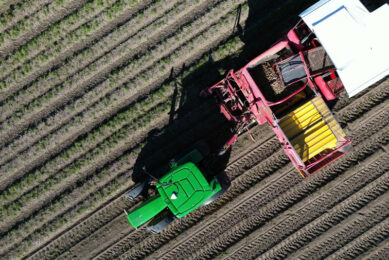John Deere Manure Sensing system DLG certified

John Deere Manure Sensing is now DLG certified for all 3 main liquid organic fertiliser types.
Cattle manure was certified in October 2017, and the German Agricultural Society has now approved the calibration for pig manure, including phosphorus (P2O5). The biogas liquid digestate calibration has also been improved and is now certified for dry matter, total N, NH4-N (ammonium N) and K2O (potassium oxide).
Site-specific prescription maps
John Deere Manure Sensing uses the HarvestLab 3000 sensor’s near-infrared (NIR) system to measure nutrient values during slurry application. The system allows farmers to apply N, P and K precisely based on a nutrient target and/or maximum rate in kg/ha, and even utilise site-specific prescription maps. The latest DLG test results have confirmed that the sensor works with comparable accuracy to certified laboratories using wet chemical methods.
“Usually there are differences in the ingredient content, once the test results from different laboratories are compared. However, the HarvestLab 3000 test results are within the determined laboratory range,” said DLG Test-Centre nutritionist and test engineer Dr Ulrich Rubenschuh.
Over 4000 measurements per second
John Deere states: “The system’s continuous analysis, with over 4000 measurements per second, is a huge benefit, providing reliable statistical data on the move. It eliminates potential errors due to incorrect sample handling, temporary storage and time critical sample shipments. Moreover, laboratory test results are only available several days, if not weeks, after the job is done. By contrast, real-time results allow automatic in-field adjustments.”
Text continues underneath image
Since the analyses take place in the field, the settlement of nutrients in the tanker is also completely accounted for. An official comparison conducted in the Netherlands with over 300 different manure samples proved that continuous, 100 per cent measurement of each complete tank load with NIR could eliminate average standard deviation errors of 4.2 per cent for nitrogen and 16.3 per cent for phosphate, when compared to measuring only five samples per tanker load.
Analyse slurry during filling
Customers who prefer to analyse their slurry during filling can also benefit from the John Deere Manure Sensing technology. Fliegl Agrartechnik is now offering a stationary solution that works with the HarvestLab 3000 sensor, including the latest John Deere Manure Sensing calibration bundle.
Documentation based on NIR measurements of liquid organic fertilisers has already been accepted by the first state governments in Germany, and John Deere expects that other states and countries will soon follow.
Text continues underneath video
According to John Deere, all new customers automatically receive the latest calibration software when purchasing the John Deere Manure Sensing system, while existing customers will receive a free update.
John Deere expands distribution of Manure Sensing
“Given the excellent experience of the system this season, we have decided to expand distribution to all EU28+ countries from November 1, 2018. To date availability has been limited to a few Western European markets (Austria, Belgium, Denmark, France, Germany, Ireland, Luxembourg, Netherlands and the UK),” says John Deere.
In addition, John Deere has signed an agreement with Kotte Landtechnik as the latest slurry tanker manufacturer to offer the John Deere Manure Sensing technology, alongside existing partner companies Fliegl, Joskin, Pichon, Samson and Vervaet.
Also read: John Deere adds air boom fertiliser spreader option
Join 17,000+ subscribers
Subscribe to our newsletter to stay updated about all the need-to-know content in the agricultural sector, two times a week.



